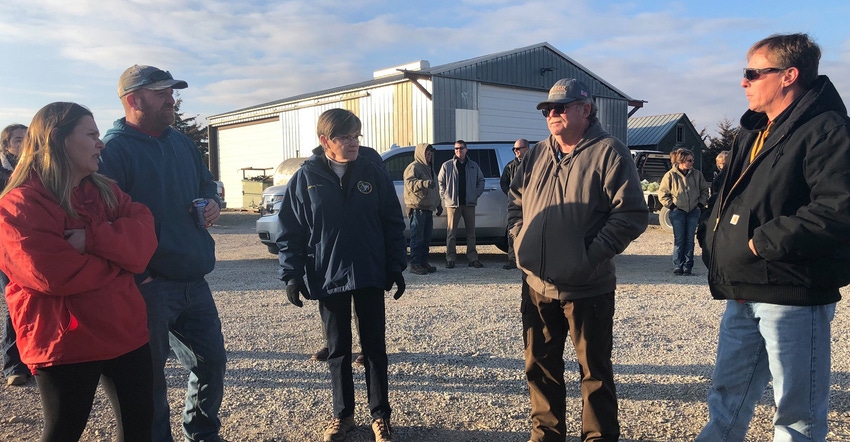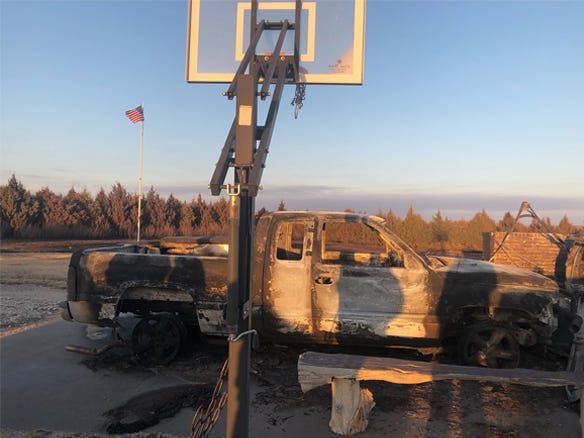
As many survivors will attest, the flames and the ashes are just the first wave of a wildfire disaster. What comes afterward — the recovery and navigation of support programs — can be just as difficult.
But in the last six years, Kansas government agencies, farmer-led organizations and community groups have learned how to be quicker and more efficient in their response to disasters like the 165,000-acre, Four-County Wildfire of Dec. 15. And one of those methods is hosting a postfire informational meeting, like the one held Dec. 29, at the Natoma Elementary Gym in Natoma, Kan.
The meeting was hosted by the Kansas Livestock Association and Kansas Farm Bureau to provide updated information to farmers and ranchers affected by the wildfires. Many programs offered through USDA underwent helpful changes in the most recent farm bill, following producer input from past devastating Kansas wildfires.
Agency programs
Agency representatives spoke about assistance programs for livestock and feed losses, farm loans to help affected producers, conservation program initiatives that will help recover grazing lands, and even fence standards for producers using government cost-share programs to help replace fencing lost to fires.
Todd Barrows, Farm Program division chief for the Farm Service Agency, led off the lineup, discussing changes to the Livestock Indemnity Program and the Emergency Livestock Assistance Program that came out in the 2018 Farm Bill.
“With the 2018 Farm Bill, Congress made some significant changes to the LIP as far as documentation,” he said. While there is still a list of acceptable records, the onus is now on county committees to determine what will and will not be acceptable documentation of livestock beginning inventories. These can include a KLA Redbook, a calendar with cow numbers and breeding records, herd improvement records, registration papers, or other contemporaneous producer records.
The meeting was recorded and can be viewed online at the KDA Kansas Recovery Resources website, along with materials and links to everything presented.
Governor’s visit
Kansas Gov. Laura Kelly and Kansas Secretary of Agriculture Mike Beam spent the day of the Dec. 29 meeting going around to Russell and Osborne County farms and ranches that were in the path of the Four-County Wildfire. The two spoke with and consoled producers who lost cattle, fences, hay — and in some cases their homes — to the fast-moving wildfire.
Kelly spoke at the meeting about how the wildfire inflicted powerful wounds upon producers that won’t likely heal overnight.
“We as a state cannot come out here for a week or two and help with that,” she said. “We need to stay in constant touch over the next — at least — year, and probably longer, as we really work through this.” She encouraged producers to reach out to the KDA and other government agencies, or to their elected representatives, if there are ways that producers could be helped in a more efficient manner.

One of those ways is the recent call to implement a sales tax exemption on fencing materials for recovery efforts. In 2016, after the wildfires around Ashland, the Kansas State Legislature passed an ad hoc bill that eliminated the sales tax on supplies for fencing, Kelly said. Another such measure is being fast-tracked through the Legislature for this blaze but will also be retroactive, she said. In addition, it will include a trigger so that going forward, if another disaster like this should occur, the sales tax exemption will be put into place automatically.
According to the governor’s office, tax exemptions must be passed by law through the Kansas Legislature. Currently, Notice 17-01 only applies to wildfires that took place in 2016 and 2017.
Additionally, Kelly had directed the Kansas Department of Revenue to work with wildfire survivors to expedite replacement of driver’s licenses and other documents that may have been lost in the fire. The KDA has a helpful one-stop website with links to not only government resources, but also program and mental links from community foundations, local entities, the Kansas Livestock Foundation and more at
About the Author(s)
You May Also Like






